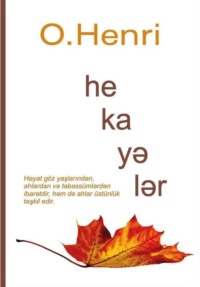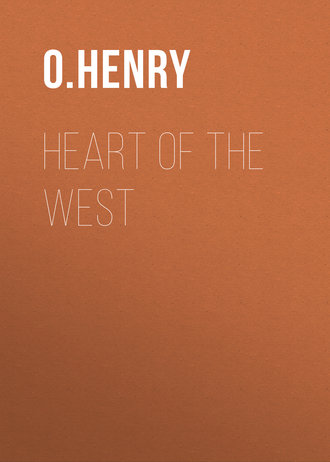 полная версия
полная версияHeart of the West
"The proposition hits me just right," says I. "Let's be nabobs for a while and see how it feels. What'll we do-take in the Niagara Falls, or buck at faro?"
"For a good many years," says Mack, "I've thought that if I ever had extravagant money I'd rent a two-room cabin somewhere, hire a Chinaman to cook, and sit in my stocking feet and read Buckle's History of Civilisation."
"That sounds self-indulgent and gratifying without vulgar ostentation," says I; "and I don't see how money could be better invested. Give me a cuckoo clock and a Sep Winner's Self-Instructor for the Banjo, and I'll join you."
A week afterwards me and Mack hits this small town of Pina, about thirty miles out from Denver, and finds an elegant two-room house that just suits us. We deposited half-a-peck of money in the Pina bank and shook hands with every one of the 340 citizens in the town. We brought along the Chinaman and the cuckoo clock and Buckle and the Instructor with us from Denver; and they made the cabin seem like home at once.
Never believe it when they tell you riches don't bring happiness. If you could have seen old Mack sitting in his rocking-chair with his blue-yarn sock feet up in the window and absorbing in that Buckle stuff through his specs you'd have seen a picture of content that would have made Rockefeller jealous. And I was learning to pick out "Old Zip Coon" on the banjo, and the cuckoo was on time with his remarks, and Ah Sing was messing up the atmosphere with the handsomest smell of ham and eggs that ever laid the honeysuckle in the shade. When it got too dark to make out Buckle's nonsense and the notes in the Instructor, me and Mack would light our pipes and talk about science and pearl diving and sciatica and Egypt and spelling and fish and trade-winds and leather and gratitude and eagles, and a lot of subjects that we'd never had time to explain our sentiments about before.
One evening Mack spoke up and asked me if I was much apprised in the habits and policies of women folks.
"Why, yes," says I, in a tone of voice; "I know 'em from Alfred to Omaha. The feminine nature and similitude," says I, "is as plain to my sight as the Rocky Mountains is to a blue-eyed burro. I'm onto all their little side-steps and punctual discrepancies."
"I tell you, Andy," says Mack, with a kind of sigh, "I never had the least amount of intersection with their predispositions. Maybe I might have had a proneness in respect to their vicinity, but I never took the time. I made my own living since I was fourteen; and I never seemed to get my ratiocinations equipped with the sentiments usually depicted toward the sect. I sometimes wish I had," says old Mack.
"They're an adverse study," says I, "and adapted to points of view. Although they vary in rationale, I have found 'em quite often obviously differing from each other in divergences of contrast."
"It seems to me," goes on Mack, "that a man had better take 'em in and secure his inspirations of the sect when he's young and so preordained. I let my chance go by; and I guess I'm too old now to go hopping into the curriculum."
"Oh, I don't know," I tells him. "Maybe you better credit yourself with a barrel of money and a lot of emancipation from a quantity of uncontent. Still, I don't regret my knowledge of 'em," I says. "It takes a man who understands the symptoms and by-plays of women-folks to take care of himself in this world."
We stayed on in Pina because we liked the place. Some folks might enjoy their money with noise and rapture and locomotion; but me and Mack we had had plenty of turmoils and hotel towels. The people were friendly; Ah Sing got the swing of the grub we liked; Mack and Buckle were as thick as two body-snatchers, and I was hitting out a cordial resemblance to "Buffalo Gals, Can't You Come Out To-night," on the banjo.
One day I got a telegram from Speight, the man that was working on a mine I had an interest in out in New Mexico. I had to go out there; and I was gone two months. I was anxious to get back to Pina and enjoy life once more.
When I struck the cabin I nearly fainted. Mack was standing in the door; and if angels ever wept, I saw no reason why they should be smiling then.
That man was a spectacle. Yes; he was worse; he was a spyglass; he was the great telescope in the Lick Observatory. He had on a coat and shiny shoes and a white vest and a high silk hat; and a geranium as big as an order of spinach was spiked onto his front. And he was smirking and warping his face like an infernal storekeeper or a kid with colic.
"Hello, Andy," says Mack, out of his face. "Glad to see you back. Things have happened since you went away."
"I know it," says I, "and a sacrilegious sight it is. God never made you that way, Mack Lonsbury. Why do you scarify His works with this presumptuous kind of ribaldry?"
"Why, Andy," says he, "they've elected me justice of the peace since you left."
I looked at Mack close. He was restless and inspired. A justice of the peace ought to be disconsolate and assuaged.
Just then a young woman passed on the sidewalk; and I saw Mack kind of half snicker and blush, and then he raised up his hat and smiled and bowed, and she smiled and bowed, and went on by.
"No hope for you," says I, "if you've got the Mary-Jane infirmity at your age. I thought it wasn't going to take on you. And patent leather shoes! All this in two little short months!"
"I'm going to marry the young lady who just passed to-night," says Mack, in a kind of flutter.
"I forgot something at the post-office," says I, and walked away quick.
I overtook that young woman a hundred yards away. I raised my hat and told her my name. She was about nineteen; and young for her age. She blushed, and then looked at me cool, like I was the snow scene from the "Two Orphans."
"I understand you are to be married to-night," I said.
"Correct," says she. "You got any objections?"
"Listen, sissy," I begins.
"My name is Miss Rebosa Redd," says she in a pained way.
"I know it," says I. "Now, Rebosa, I'm old enough to have owed money to your father. And that old, specious, dressed-up, garbled, sea-sick ptomaine prancing about avidiously like an irremediable turkey gobbler with patent leather shoes on is my best friend. Why did you go and get him invested in this marriage business?"
"Why, he was the only chance there was," answers Miss Rebosa.
"Nay," says I, giving a sickening look of admiration at her complexion and style of features; "with your beauty you might pick any kind of a man. Listen, Rebosa. Old Mack ain't the man you want. He was twenty- two when you was /nee/ Reed, as the papers say. This bursting into bloom won't last with him. He's all ventilated with oldness and rectitude and decay. Old Mack's down with a case of Indian summer. He overlooked his bet when he was young; and now he's suing Nature for the interest on the promissory note he took from Cupid instead of the cash. Rebosa, are you bent on having this marriage occur?"
"Why, sure I am," says she, oscillating the pansies on her hat, "and so is somebody else, I reckon."
"What time is it to take place?" I asks.
"At six o'clock," says she.
I made up my mind right away what to do. I'd save old Mack if I could. To have a good, seasoned, ineligible man like that turn chicken for a girl that hadn't quit eating slate pencils and buttoning in the back was more than I could look on with easiness.
"Rebosa," says I, earnest, drawing upon my display of knowledge concerning the feminine intuitions of reason-"ain't there a young man in Pina-a nice young man that you think a heap of?"
"Yep," says Rebosa, nodding her pansies-"Sure there is! What do you think! Gracious!"
"Does he like you?" I asks. "How does he stand in the matter?"
"Crazy," says Rebosa. "Ma has to wet down the front steps to keep him from sitting there all the time. But I guess that'll be all over after to-night," she winds up with a sigh.
"Rebosa," says I, "you don't really experience any of this adoration called love for old Mack, do you?"
"Lord! no," says the girl, shaking her head. "I think he's as dry as a lava bed. The idea!"
"Who is this young man that you like, Rebosa?" I inquires.
"It's Eddie Bayles," says she. "He clerks in Crosby's grocery. But he don't make but thirty-five a month. Ella Noakes was wild about him once."
"Old Mack tells me," I says, "that he's going to marry you at six o'clock this evening."
"That's the time," says she. "It's to be at our house."
"Rebosa," says I, "listen to me. If Eddie Bayles had a thousand dollars cash-a thousand dollars, mind you, would buy him a store of his own-if you and Eddie had that much to excuse matrimony on, would you consent to marry him this evening at five o'clock?"
The girl looks at me a minute; and I can see these inaudible cogitations going on inside of her, as women will.
"A thousand dollars?" says she. "Of course I would."
"Come on," says I. "We'll go and see Eddie."
We went up to Crosby's store and called Eddie outside. He looked to be estimable and freckled; and he had chills and fever when I made my proposition.
"At five o'clock?" says he, "for a thousand dollars? Please don't wake me up! Well, you /are/ the rich uncle retired from the spice business in India! I'll buy out old Crosby and run the store myself."
We went inside and got old man Crosby apart and explained it. I wrote my check for a thousand dollars and handed it to him. If Eddie and Rebosa married each other at five he was to turn the money over to them.
And then I gave 'em my blessing, and went to wander in the wildwood for a season. I sat on a log and made cogitations on life and old age and the zodiac and the ways of women and all the disorder that goes with a lifetime. I passed myself congratulations that I had probably saved my old friend Mack from his attack of Indian summer. I knew when he got well of it and shed his infatuation and his patent leather shoes, he would feel grateful. "To keep old Mack disinvolved," thinks I, "from relapses like this, is worth more than a thousand dollars." And most of all I was glad that I'd made a study of women, and wasn't to be deceived any by their means of conceit and evolution.
It must have been half-past five when I got back home. I stepped in; and there sat old Mack on the back of his neck in his old clothes with his blue socks on the window and the History of Civilisation propped up on his knees.
"This don't look like getting ready for a wedding at six," I says, to seem innocent.
"Oh," says Mack, reaching for his tobacco, "that was postponed back to five o'clock. They sent me over a note saying the hour had been changed. It's all over now. What made you stay away so long, Andy?"
"You heard about the wedding?" I asks.
"I operated it," says he. "I told you I was justice of the peace. The preacher is off East to visit his folks, and I'm the only one in town that can perform the dispensations of marriage. I promised Eddie and Rebosa a month ago I'd marry 'em. He's a busy lad; and he'll have a grocery of his own some day."
"He will," says I.
"There was lots of women at the wedding," says Mack, smoking up. "But I didn't seem to get any ideas from 'em. I wish I was informed in the structure of their attainments like you said you was."
"That was two months ago," says I, reaching up for the banjo.
III
TELEMACHUS, FRIEND
Returning from a hunting trip, I waited at the little town of Los Pinos, in New Mexico, for the south-bound train, which was one hour late. I sat on the porch of the Summit House and discussed the functions of life with Telemachus Hicks, the hotel proprietor.
Perceiving that personalities were not out of order, I asked him what species of beast had long ago twisted and mutilated his left ear. Being a hunter, I was concerned in the evils that may befall one in the pursuit of game.
"That ear," says Hicks, "is the relic of true friendship."
"An accident?" I persisted.
"No friendship is an accident," said Telemachus; and I was silent.
"The only perfect case of true friendship I ever knew," went on my host, "was a cordial intent between a Connecticut man and a monkey. The monkey climbed palms in Barranquilla and threw down cocoanuts to the man. The man sawed them in two and made dippers, which he sold for two /reales/ each and bought rum. The monkey drank the milk of the nuts. Through each being satisfied with his own share of the graft, they lived like brothers.
"But in the case of human beings, friendship is a transitory art, subject to discontinuance without further notice.
"I had a friend once, of the entitlement of Paisley Fish, that I imagined was sealed to me for an endless space of time. Side by side for seven years we had mined, ranched, sold patent churns, herded sheep, took photographs and other things, built wire fences, and picked prunes. Thinks I, neither homocide nor flattery nor riches nor sophistry nor drink can make trouble between me and Paisley Fish. We was friends an amount you could hardly guess at. We was friends in business, and we let our amicable qualities lap over and season our hours of recreation and folly. We certainly had days of Damon and nights of Pythias.
"One summer me and Paisley gallops down into these San Andres mountains for the purpose of a month's surcease and levity, dressed in the natural store habiliments of man. We hit this town of Los Pinos, which certainly was a roof-garden spot of the world, and flowing with condensed milk and honey. It had a street or two, and air, and hens, and a eating-house; and that was enough for us.
"We strikes the town after supper-time, and we concludes to sample whatever efficacy there is in this eating-house down by the railroad tracks. By the time we had set down and pried up our plates with a knife from the red oil-cloth, along intrudes Widow Jessup with the hot biscuit and the fried liver.
"Now, there was a woman that would have tempted an anchovy to forget his vows. She was not so small as she was large; and a kind of welcome air seemed to mitigate her vicinity. The pink of her face was the /in hoc signo/ of a culinary temper and a warm disposition, and her smile would have brought out the dogwood blossoms in December.
"Widow Jessup talks to us a lot of garrulousness about the climate and history and Tennyson and prunes and the scarcity of mutton, and finally wants to know where we came from.
"'Spring Valley,' says I.
"'Big Spring Valley,' chips in Paisley, out of a lot of potatoes and knuckle-bone of ham in his mouth.
"That was the first sign I noticed that the old /fidus Diogenes/ business between me and Paisley Fish was ended forever. He knew how I hated a talkative person, and yet he stampedes into the conversation with his amendments and addendums of syntax. On the map it was Big Spring Valley; but I had heard Paisley himself call it Spring Valley a thousand times.
"Without saying any more, we went out after supper and set on the railroad track. We had been pardners too long not to know what was going on in each other's mind.
"'I reckon you understand,' says Paisley, 'that I've made up my mind to accrue that widow woman as part and parcel in and to my hereditaments forever, both domestic, sociable, legal, and otherwise, until death us do part.'
"'Why, yes,' says I, 'I read it between the lines, though you only spoke one. And I suppose you are aware,' says I, 'that I have a movement on foot that leads up to the widow's changing her name to Hicks, and leaves you writing to the society column to inquire whether the best man wears a japonica or seamless socks at the wedding!'
"'There'll be some hiatuses in your program,' says Paisley, chewing up a piece of a railroad tie. 'I'd give in to you,' says he, 'in 'most any respect if it was secular affairs, but this is not so. The smiles of woman,' goes on Paisley, 'is the whirlpool of Squills and Chalybeates, into which vortex the good ship Friendship is often drawn and dismembered. I'd assault a bear that was annoying you,' says Paisley, 'or I'd endorse your note, or rub the place between your shoulder-blades with opodeldoc the same as ever; but there my sense of etiquette ceases. In this fracas with Mrs. Jessup we play it alone. I've notified you fair.'
"And then I collaborates with myself, and offers the following resolutions and by-laws:
"'Friendship between man and man,' says I, 'is an ancient historical virtue enacted in the days when men had to protect each other against lizards with eighty-foot tails and flying turtles. And they've kept up the habit to this day, and stand by each other till the bellboy comes up and tells them the animals are not really there. I've often heard,' I says, 'about ladies stepping in and breaking up a friendship between men. Why should that be? I'll tell you, Paisley, the first sight and hot biscuit of Mrs. Jessup appears to have inserted a oscillation into each of our bosoms. Let the best man of us have her. I'll play you a square game, and won't do any underhanded work. I'll do all of my courting of her in your presence, so you will have an equal opportunity. With that arrangement I don't see why our steamboat of friendship should fall overboard in the medicinal whirlpools you speak of, whichever of us wins out.'
"'Good old hoss!' says Paisley, shaking my hand. 'And I'll do the same,' says he. 'We'll court the lady synonymously, and without any of the prudery and bloodshed usual to such occasions. And we'll be friends still, win or lose.'
"At one side of Mrs. Jessup's eating-house was a bench under some trees where she used to sit in the breeze after the south-bound had been fed and gone. And there me and Paisley used to congregate after supper and make partial payments on our respects to the lady of our choice. And we was so honorable and circuitous in our calls that if one of us got there first we waited for the other before beginning any gallivantery.
"The first evening that Mrs. Jessup knew about our arrangement I got to the bench before Paisley did. Supper was just over, and Mrs. Jessup was out there with a fresh pink dress on, and almost cool enough to handle.
"I sat down by her and made a few specifications about the moral surface of nature as set forth by the landscape and the contiguous perspective. That evening was surely a case in point. The moon was attending to business in the section of sky where it belonged, and the trees was making shadows on the ground according to science and nature, and there was a kind of conspicuous hullabaloo going on in the bushes between the bullbats and the orioles and the jack-rabbits and other feathered insects of the forest. And the wind out of the mountains was singing like a Jew's-harp in the pile of old tomato-cans by the railroad track.
"I felt a kind of sensation in my left side-something like dough rising in a crock by the fire. Mrs. Jessup had moved up closer.
"'Oh, Mr. Hicks,' says she, 'when one is alone in the world, don't they feel it more aggravated on a beautiful night like this?'
"I rose up off the bench at once.
"'Excuse me, ma'am,' says I, 'but I'll have to wait till Paisley comes before I can give a audible hearing to leading questions like that.'
"And then I explained to her how we was friends cinctured by years of embarrassment and travel and complicity, and how we had agreed to take no advantage of each other in any of the more mushy walks of life, such as might be fomented by sentiment and proximity. Mrs. Jessup appears to think serious about the matter for a minute, and then she breaks into a species of laughter that makes the wildwood resound.
"In a few minutes Paisley drops around, with oil of bergamot on his hair, and sits on the other side of Mrs. Jessup, and inaugurates a sad tale of adventure in which him and Pieface Lumley has a skinning-match of dead cows in '95 for a silver-mounted saddle in the Santa Rita valley during the nine months' drought.
"Now, from the start of that courtship I had Paisley Fish hobbled and tied to a post. Each one of us had a different system of reaching out for the easy places in the female heart. Paisley's scheme was to petrify 'em with wonderful relations of events that he had either come across personally or in large print. I think he must have got his idea of subjugation from one of Shakespeare's shows I see once called 'Othello.' There is a coloured man in it who acquires a duke's daughter by disbursing to her a mixture of the talk turned out by Rider Haggard, Lew Dockstader, and Dr. Parkhurst. But that style of courting don't work well off the stage.
"Now, I give you my own recipe for inveigling a woman into that state of affairs when she can be referred to as '/nee/ Jones.' Learn how to pick up her hand and hold it, and she's yours. It ain't so easy. Some men grab at it so much like they was going to set a dislocation of the shoulder that you can smell the arnica and hear 'em tearing off bandages. Some take it up like a hot horseshoe, and hold it off at arm's length like a druggist pouring tincture of asafoetida in a bottle. And most of 'em catch hold of it and drag it right out before the lady's eyes like a boy finding a baseball in the grass, without giving her a chance to forget that the hand is growing on the end of her arm. Them ways are all wrong.
"I'll tell you the right way. Did you ever see a man sneak out in the back yard and pick up a rock to throw at a tomcat that was sitting on a fence looking at him? He pretends he hasn't got a thing in his hand, and that the cat don't see him, and that he don't see the cat. That's the idea. Never drag her hand out where she'll have to take notice of it. Don't let her know that you think she knows you have the least idea she is aware you are holding her hand. That was my rule of tactics; and as far as Paisley's serenade about hostilities and misadventure went, he might as well have been reading to her a time- table of the Sunday trains that stop at Ocean Grove, New Jersey.
"One night when I beat Paisley to the bench by one pipeful, my friendship gets subsidised for a minute, and I asks Mrs. Jessup if she didn't think a 'H' was easier to write than a 'J.' In a second her head was mashing the oleander flower in my button-hole, and I leaned over and-but I didn't.
"'If you don't mind,' says I, standing up, 'we'll wait for Paisley to come before finishing this. I've never done anything dishonourable yet to our friendship, and this won't be quite fair.'
"'Mr. Hicks,' says Mrs. Jessup, looking at me peculiar in the dark, 'if it wasn't for but one thing, I'd ask you to hike yourself down the gulch and never disresume your visits to my house.'
"'And what is that, ma'am?' I asks.
"'You are too good a friend not to make a good husband,' says she.
"In five minutes Paisley was on his side of Mrs. Jessup.
"'In Silver City, in the summer of '98,' he begins, 'I see Jim Batholomew chew off a Chinaman's ear in the Blue Light Saloon on account of a crossbarred muslin shirt that-what was that noise?'
"I had resumed matters again with Mrs. Jessup right where we had left off.
"'Mrs. Jessup,' says I, 'has promised to make it Hicks. And this is another of the same sort.'
"Paisley winds his feet round a leg of the bench and kind of groans.
"'Lem,' says he, 'we been friends for seven years. Would you mind not kissing Mrs. Jessup quite so loud? I'd do the same for you.'
"'All right,' says I. 'The other kind will do as well.'
"'This Chinaman,' goes on Paisley, 'was the one that shot a man named Mullins in the spring of '97, and that was-'
"Paisley interrupted himself again.
"'Lem,' says he, 'if you was a true friend you wouldn't hug Mrs. Jessup quite so hard. I felt the bench shake all over just then. You know you told me you would give me an even chance as long as there was any.'
"'Mr. Man,' says Mrs. Jessup, turning around to Paisley, 'if you was to drop in to the celebration of mine and Mr. Hicks's silver wedding, twenty-five years from now, do you think you could get it into that Hubbard squash you call your head that you are /nix cum rous/ in this business? I've put up with you a long time because you was Mr. Hicks's friend; but it seems to me it's time for you to wear the willow and trot off down the hill.'
"'Mrs. Jessup,' says I, without losing my grasp on the situation as fiance, 'Mr. Paisley is my friend, and I offered him a square deal and a equal opportunity as long as there was a chance.'


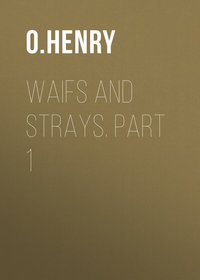

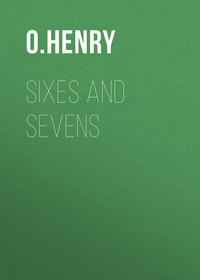
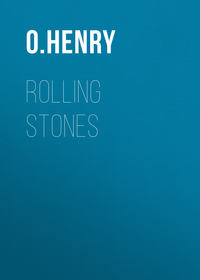


![Heart of the West [Annotated]](/covers_200/25561004.jpg)
